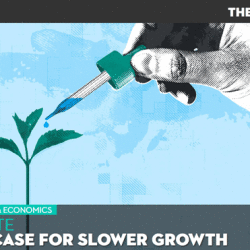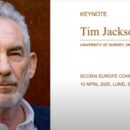
“ANYONE who believes that exponential growth can go on forever in a finite world is either a madman or an economist,” remarked (the economist) Kenneth Boulding. John Stuart Mill devoted an entire chapter of his “Principles of Political Economy” to the concept of the “stationary state”—a state that he believed would be “on the whole, a very considerable improvement on our present condition”.
Yet the pursuit of economic growth has been the single most prevalent policy goal across the world for the past 70 years. Global output is now more than eight times higher than it was in 1950. If it continues to grow at the same average rate, then the world economy will be 17 times bigger in 2100 than it is today: a staggering 146-fold increase in economic scale in the space of just a few generations.
This unprecedented ramping up of economic activity is increasingly at odds with the ecological constraints of a finite planet. By the turn of this century, it had been accompanied by the degradation of an estimated 60% of the world’s ecosystems. Earlier this year the Stockholm Resilience Centre, at Stockholm University, identified four key areas in which human activity already lies beyond the “safe operating space” of the planet: climate change, land-use change, loss of biosphere integrity and overload in bio-geochemical cycles.
The default response to this dilemma is to suppose that we can “decouple” growth from its material impacts and continue to do so as the economy expands indefinitely. But the arithmetic of decoupling is a profoundly challenging one. A widening scientific consensus now accepts, for instance, that tackling climate change entails achieving zero net carbon emissions by 2100 and an economy that is taking carbon out of the atmosphere, rather than adding to it, in the second half of this century.
What stands in the way of progress is an undying allegiance to growth at all costs
Technological options to achieve decoupling clearly exist. But the most financially attractive of them (an aggressive pursuit of energy efficiency) may simultaneously make the task harder, as another economist, William Stanley Jevons, once pointed out, by increasing demand still further. Green investment opportunities are certainly there. But financial priorities and institutional incentives are often pointing in entirely the opposite direction.
Most often, what stands in the way of progress is an undying allegiance to growth at all costs. Growth must go on, we insist: not just for the poorest countries, where a better quality of life is desperately needed; but even in the affluent West, where the satisfaction of human needs was long since transformed into a rampant and potentially damaging consumerism.
Questioning growth is now deemed to be the act of lunatics, idealists and revolutionaries. Yet question it we must. The mantra of growth has failed us. It has failed the 2 billion people who still live on less than $2 a day. It is damaging the fragile ecology on which we depend for survival. It has fuelled our addiction to spiralling debt. Prosperity for the few, founded on financial instability, ecological destruction and persistent social injustice, is no basis for a civilised society.
This blog forms part of a debate with Adam Posen, published in The Economist, The World If , 01 August 2015.
:: Image © The Economist




